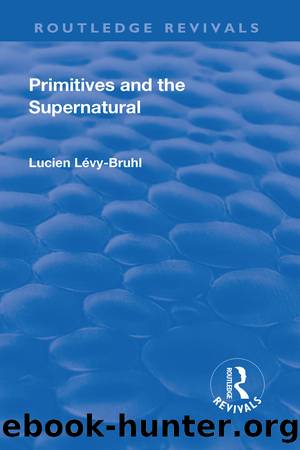Revival: Primitives and the Supernatural (1936) by Lucien Lecy-Bruhl

Author:Lucien Lecy-Bruhl [Lecy-Bruhl, Lucien]
Language: eng
Format: epub
Tags: Social Science, Anthropology, General
ISBN: 9781351346917
Google: FetTDwAAQBAJ
Publisher: Routledge
Published: 2018-03-29T04:42:54+00:00
V
Colonel Maclean observes that Kafir law does not punish acts that with us would be termed incest, thus confirming the fact that it is not, properly speaking, the subject of prohibition. He saw clearly that there was no need for it to be. âThey have a far more powerful preventive in their superstitious fears, which teach them to dread that some supernatural evil will befall the parties committing such acts; they lose caste, as it were, and are considered in the light of sorcerers: hence such crimes are seldom committed.â 2 Sorcerersâi.e., concealing within themselves a malign principle, which brings disaster, and as such they are enemies to the public at large. We remember the hatred and horror excited among most Bantus by sorcerers, and the cruel methods by which they of ten rid themselves of their presence, and to liken the incestuous to the sorcerer is saying a good deal in a few words.
In Kropfâs dictionary we read: âi-gqwira, a person who acts malevolently with the view of injuring and destroying health. He is a criminal of the deepest dye, hence the extended meaning, including any one guilty of an infamous deed, such as incest.â 1 Malevolence and misdeedsâhere we have the two main characteristics of the sorcerer in whom a harmful principle dwells. It is noteworthy that the word used to denote him is also applied to the man who commits an act of incest. In another work, speaking of a chief named Ngqika, Kropf writes: âFor a long time, his subjects were displeased with him, because Ngqika, having seduced the wife of his uncle Ndlambe, had assumed the aspect of a sorcerer in their eyes.â 2 His incestuous act had laid the country under a magic spell, and who could predict what calamities might ensue?
With Kafirs again, after circumcision, âshould a boy not be healed at the time fixed, or be still un-healed when the others already were, the men of the tribe assemble in consultation, and decide that this boy must confess his misdeeds before a number of people, so that his body may be able to heal. Should he refuse, they beat him so long and so severely that he ends by yieldingâ¦. The Amaxosa all believe that a boy who has had sexual relations with a near relative cannot be healed in the right time after being circumcised. âConfess your incest!â they say to him, when the healing is delayedâ¦. In former times this ceremonial confession, called ukubula, did not take place except in cases of incest.â 3 This remark is of importance in more than one respect. It is clear that a young boy might become guilty of incest before he had been circumcised, i.e. initiated, and the sexual liberty allowed the non-initiated did not go so far as to permit them to ignore the social laws. Moreover, this young boy, more than suspected of an incest that was proclaimed by the unusual delay in the healing of his flesh, was treated exactly like a sorcerer.
Download
This site does not store any files on its server. We only index and link to content provided by other sites. Please contact the content providers to delete copyright contents if any and email us, we'll remove relevant links or contents immediately.
Born to Run: by Christopher McDougall(7121)
The Leavers by Lisa Ko(6945)
iGen by Jean M. Twenge(5408)
Sapiens by Yuval Noah Harari(5366)
Spare by Prince Harry The Duke of Sussex(5177)
The Kite Runner by Khaled Hosseini(5170)
Machine Learning at Scale with H2O by Gregory Keys | David Whiting(4295)
Bullshit Jobs by David Graeber(4179)
Never by Ken Follett(3937)
Goodbye Paradise(3799)
Livewired by David Eagleman(3765)
Fairy Tale by Stephen King(3370)
A Dictionary of Sociology by Unknown(3073)
Harry Potter 4 - Harry Potter and The Goblet of Fire by J.K.Rowling(3061)
The Social Psychology of Inequality by Unknown(3018)
The Club by A.L. Brooks(2919)
Will by Will Smith(2911)
0041152001443424520 .pdf by Unknown(2843)
People of the Earth: An Introduction to World Prehistory by Dr. Brian Fagan & Nadia Durrani(2728)
